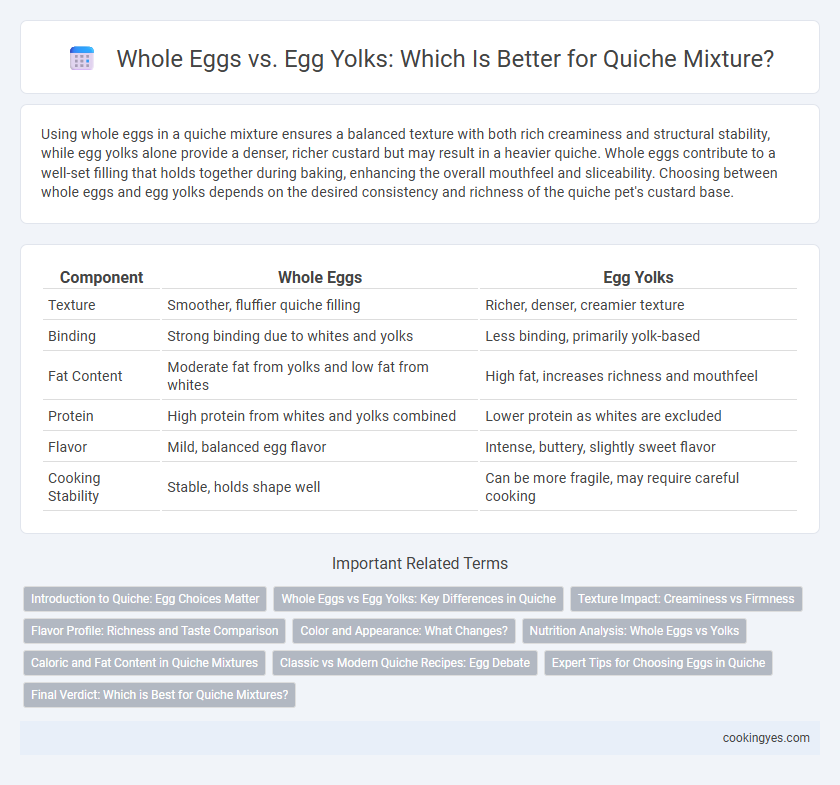Using whole eggs in a quiche mixture ensures a balanced texture with both rich creaminess and structural stability, while egg yolks alone provide a denser, richer custard but may result in a heavier quiche. Whole eggs contribute to a well-set filling that holds together during baking, enhancing the overall mouthfeel and sliceability. Choosing between whole eggs and egg yolks depends on the desired consistency and richness of the quiche pet's custard base.
Table of Comparison
| Component | Whole Eggs | Egg Yolks |
|---|---|---|
| Texture | Smoother, fluffier quiche filling | Richer, denser, creamier texture |
| Binding | Strong binding due to whites and yolks | Less binding, primarily yolk-based |
| Fat Content | Moderate fat from yolks and low fat from whites | High fat, increases richness and mouthfeel |
| Protein | High protein from whites and yolks combined | Lower protein as whites are excluded |
| Flavor | Mild, balanced egg flavor | Intense, buttery, slightly sweet flavor |
| Cooking Stability | Stable, holds shape well | Can be more fragile, may require careful cooking |
Introduction to Quiche: Egg Choices Matter
Whole eggs provide a balanced structure and creamy texture essential for a perfect quiche, blending whites and yolks for optimal firmness and richness. Egg yolks alone create a denser, custard-like consistency with intense flavor but may lack the necessary stability for slicing. Selecting the right egg composition influences the quiche's moisture, mouthfeel, and overall taste, making egg choices critical in quiche preparation.
Whole Eggs vs Egg Yolks: Key Differences in Quiche
Whole eggs provide a balanced texture and structure in quiche, combining both firmness from the whites and richness from the yolks. Egg yolks contribute a creamier, denser custard with enhanced richness but less stability, resulting in a softer set. Using whole eggs typically yields a firmer, more cohesive quiche, while relying on yolks alone produces a richer, creamier filling.
Texture Impact: Creaminess vs Firmness
Whole eggs contribute to a balanced quiche texture by combining the creamy richness of egg yolks with the firm structure provided by egg whites, resulting in a custard that is both smooth and stable. Using only egg yolks intensifies creaminess and richness but can lead to a denser, less set filling that may be too soft to hold its shape well. Optimal texture in quiche is achieved by adjusting the ratio of whole eggs to yolks, with whole eggs predominantly used to ensure proper firmness and sliceability while maintaining a luscious mouthfeel.
Flavor Profile: Richness and Taste Comparison
Whole eggs provide a balanced flavor and a creamy texture that contributes to the quiche's overall richness without overwhelming other ingredients. Egg yolks intensify the quiche's richness with a deeper, more buttery taste, enhancing the savory profile and mouthfeel. Using a higher ratio of yolks results in a silkier custard but may mask delicate flavors, whereas whole eggs yield a lighter, more harmonious flavor balance.
Color and Appearance: What Changes?
Using whole eggs in a quiche mixture results in a richer yellow color and a firmer texture due to the balanced presence of egg whites and yolks. Incorporating only egg yolks intensifies the golden hue and produces a creamier, more custard-like consistency, enhancing visual appeal with a glossy finish. Adjusting the egg ratio directly impacts the quiche's color vibrancy and surface smoothness, influencing overall presentation.
Nutrition Analysis: Whole Eggs vs Yolks
Whole eggs in quiche mixtures provide a balanced nutritional profile, offering high-quality protein, essential vitamins such as B12, and minerals like selenium, while containing moderate fat and cholesterol levels. Egg yolks are richer in fat, cholesterol, and fat-soluble vitamins A, D, E, and K, contributing to richer flavor and texture but increasing calorie density. Choosing whole eggs supports a lower fat and cholesterol content in quiche, beneficial for heart health, whereas yolk-heavy recipes intensify taste and nutrient concentration but may require moderation for cholesterol-sensitive diets.
Caloric and Fat Content in Quiche Mixtures
Whole eggs provide a balanced mix of protein, fat, and essential nutrients, contributing approximately 70 calories and 5 grams of fat per egg in quiche mixtures. Egg yolks, while richer in flavor and creaminess, contain higher fat content, about 55 calories and 4.5 grams of fat each, predominantly from healthy fats. Using a combination of whole eggs and yolks in quiche recipes allows for controlled caloric and fat intake, optimizing texture without excessive richness.
Classic vs Modern Quiche Recipes: Egg Debate
Classic quiche recipes typically call for whole eggs, blending both egg whites and yolks to create a firm yet tender custard that holds the filling together. Modern quiche variations increasingly emphasize egg yolks to achieve a richer, creamier texture with enhanced mouthfeel and deeper flavor profiles. The balance between whole eggs and yolks significantly impacts the quiche's structure, with whole eggs providing stability and yolks contributing to a luscious, velvety consistency favored in contemporary culinary trends.
Expert Tips for Choosing Eggs in Quiche
Whole eggs provide a balanced texture and rich flavor essential for a classic quiche, while using only egg yolks results in a denser, creamier custard that enhances richness. Experts recommend prioritizing fresh, organic eggs for optimal taste and consistency, as freshness directly impacts the quiche's set and mouthfeel. For a perfectly light yet creamy quiche, a common ratio is three whole eggs combined with one or two additional yolks.
Final Verdict: Which is Best for Quiche Mixtures?
Using whole eggs in quiche mixtures provides a balanced structure and creamy texture, offering both richness from the yolks and firmness from the whites. Egg yolks alone create a denser, custard-like filling with enhanced flavor but may lack the necessary firmness to hold the quiche's shape. For optimal consistency and taste, whole eggs are typically the best choice for quiche mixtures.
Whole Eggs vs Egg Yolks for Quiche Mixture Infographic

 cookingyes.com
cookingyes.com